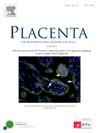阿片类药物暴露与非阿片类药物暴露妊娠的胎盘转录组分析
IF 3
2区 医学
Q2 DEVELOPMENTAL BIOLOGY
引用次数: 0
摘要
妊娠期阿片类药物暴露可能显著改变胎盘中的基因表达,可能破坏其功能并影响胎儿大脑发育。这些改变可能导致不良后果,如新生儿阿片类药物戒断综合征(NOWS)。在这项研究中,我们旨在系统地研究胎盘基因表达与母体阿片类药物暴露相关的变化,以更好地了解潜在的分子机制及其对胎儿健康的影响。方法采集18例阿片类药物暴露妊娠和26例非阿片类药物暴露对照妊娠的新鲜胎盘组织标本。使用RNA测序(RNA-seq)评估与阿片类药物暴露相关的转录组学变化。结果在检测到的16172个基因中,有55个存在差异表达(p校正<;0.25或未调整<;0.001)。基因集富集分析(GSEA)显示,差异表达基因主要与免疫应答、神经元发育和功能以及细胞复制和分裂有关。使用PlacentaCellEnrich程序计算反褶积鉴定了NK细胞个体中显著富集的上调基因。此外,DNA甲基化和基因表达的综合分析显示,在阿片类药物暴露的胎盘中,下调基因中差异甲基化基因的富集。我们的研究结果表明,怀孕期间阿片类药物暴露可能会破坏关键的胎盘通路,特别是那些与免疫反应有关的通路。未来的研究重点是特定胎盘细胞类型的转录组变化,这对于充分了解妊娠期间阿片类药物暴露导致的胎盘结构和功能改变至关重要。本文章由计算机程序翻译,如有差异,请以英文原文为准。
Placental transcriptome analysis in opioid-exposed versus non-opioid exposed pregnancies
Introduction
Opioid exposure during pregnancy may significantly alter gene expression in the placenta, potentially disrupting its function and influencing fetal brain development. These alterations may contribute to adverse outcomes such as neonatal opioid withdrawal syndrome (NOWS). In this study, we aim to systematically investigate the changes in placental gene expression associated with maternal opioid exposure to better understand the underlying molecular mechanisms and their implications for fetal health.
Methods
Fresh placental tissue samples were collected from 18 opioid-exposed pregnancies and 26 non-opioid-exposed control pregnancies. Transcriptomic changes related to opioid exposure were assessed using RNA sequencing (RNA-seq).
Results
Among the 16,172 genes detected, 55 showed differential expression (Padjusted < 0.25 or Punadjusted < 0.001) in opioid-exposed placentas. Gene Set Enrichment Analysis (GSEA) revealed that the differentially expressed genes were primarily associated with immune responses, neuronal development and function, as well as cell replication and division. Computational deconvolution using the PlacentaCellEnrich program identified significant enrichment of upregulated genes in decidual NK cells. Furthermore, integrative analysis of DNA methylation and gene expression showed an enrichment of differentially methylated genes among downregulated genes in opioid-exposed placentas.
Discussion
Our findings suggest that opioid exposure during pregnancy may disrupt critical placental pathways, particularly those involved in immune responses. Future studies focusing on transcriptomic changes in specific placental cell types will be essential for fully understanding the structural and functional alterations in the placenta due to opioid exposure during pregnancy.
求助全文
通过发布文献求助,成功后即可免费获取论文全文。
去求助
来源期刊

Placenta
医学-发育生物学
CiteScore
6.30
自引率
10.50%
发文量
391
审稿时长
78 days
期刊介绍:
Placenta publishes high-quality original articles and invited topical reviews on all aspects of human and animal placentation, and the interactions between the mother, the placenta and fetal development. Topics covered include evolution, development, genetics and epigenetics, stem cells, metabolism, transport, immunology, pathology, pharmacology, cell and molecular biology, and developmental programming. The Editors welcome studies on implantation and the endometrium, comparative placentation, the uterine and umbilical circulations, the relationship between fetal and placental development, clinical aspects of altered placental development or function, the placental membranes, the influence of paternal factors on placental development or function, and the assessment of biomarkers of placental disorders.
 求助内容:
求助内容: 应助结果提醒方式:
应助结果提醒方式:


